What is a Nursing Cover Letter
A nursing cover letter is a crucial document accompanying your resume when applying for a nursing position. It serves as a personal introduction, allowing you to highlight your relevant skills, experience, and qualifications beyond what’s listed in your resume. This letter gives you the opportunity to demonstrate your passion for nursing, explain why you’re a great fit for the specific role, and showcase your understanding of the healthcare facility’s needs. A well-crafted cover letter can significantly increase your chances of getting an interview.
Importance of a Nursing Cover Letter
The importance of a nursing cover letter cannot be overstated. It is your first impression on potential employers. It provides context to your resume, helping the hiring manager understand your career goals and why you’re interested in the position. A strong cover letter demonstrates your communication skills, professionalism, and attention to detail, which are all essential qualities for nurses. It allows you to personalize your application and tailor it to the specific job requirements, making you stand out from other candidates. A well-written cover letter can set you apart from other applicants.
How to Write a Nursing Cover Letter
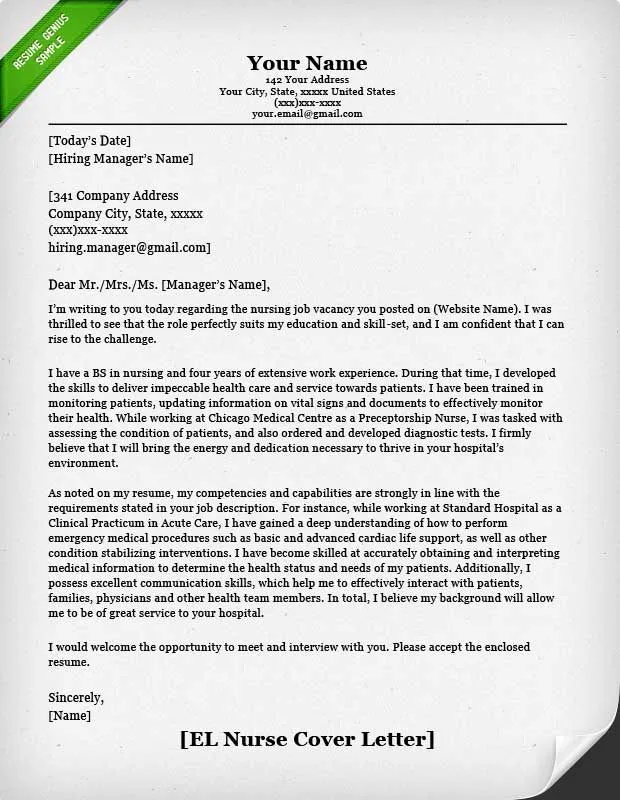
Writing a compelling nursing cover letter requires careful planning and execution. Structure and content must align to create the best impact. Focus on key elements like an impressive header and relevant content. You must be mindful of your audience. Each section has its role to highlight your suitability for the role. Following these steps can help you create a cover letter that increases your chances of success.
Header of your Cover Letter
The header is the first thing the hiring manager sees, so it’s crucial to get it right. It should include your full name, contact information (phone number and email address), and sometimes your professional title or certifications. Make sure the header is well-formatted and easy to read, and it should be at the top of the page. Using a professional font will add a touch of professionalism. This ensures the reader can quickly identify you and easily reach out. It is a foundational step in starting on the right foot.
Your Contact Information
Include your full name, phone number, and professional email address. Ensure your email address is professional. Avoid using nicknames or informal addresses.
Date and Recipient’s Information
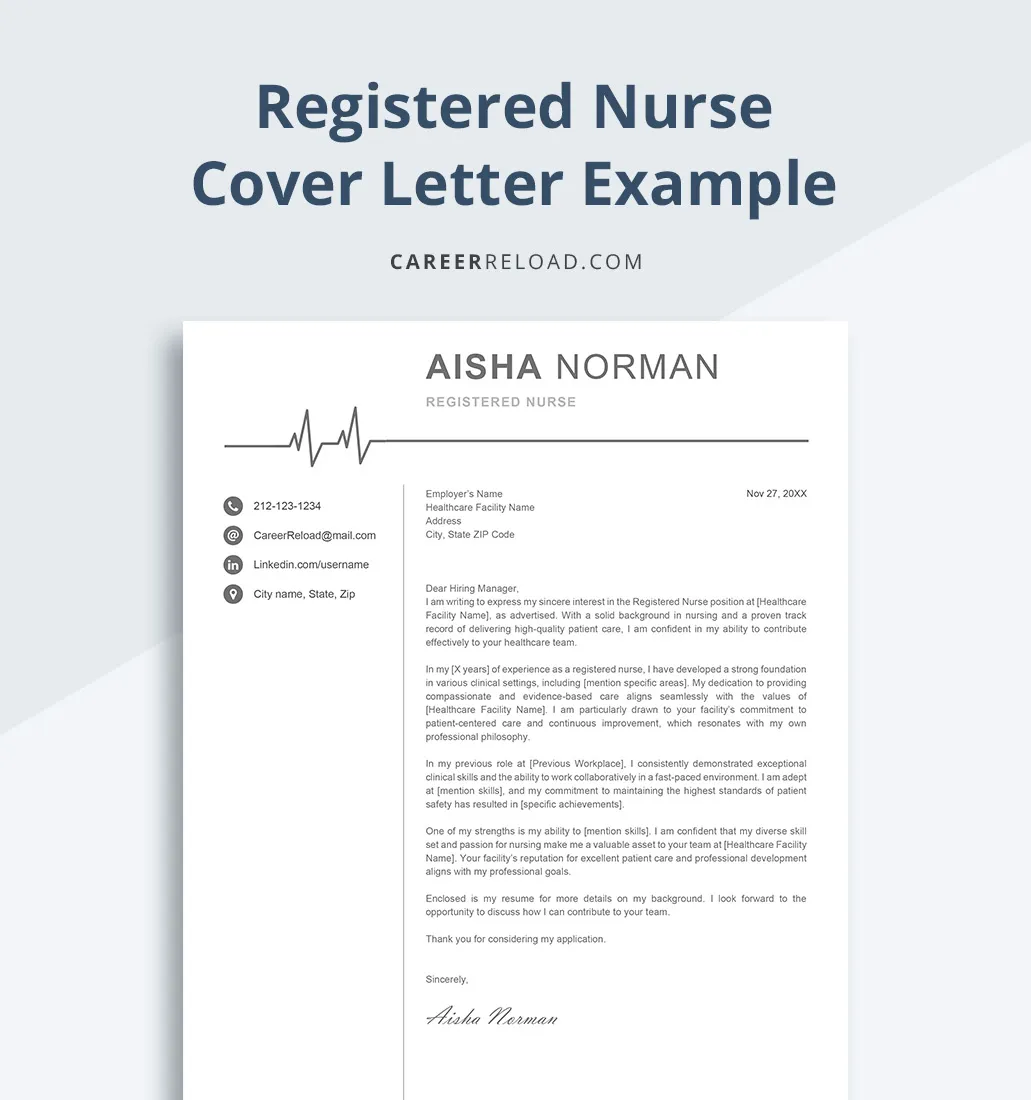
Below your header, include the date and the recipient’s information. Include the hiring manager’s name and title, the name of the healthcare facility, and the facility’s address. If you don’t know the hiring manager’s name, try to find it on the facility’s website or LinkedIn. If you cannot find a name, use a general salutation.
Salutation
Use a professional salutation, such as “Dear Mr./Ms. [Last Name],” if you know the hiring manager’s name. If you don’t know the name, use “Dear Hiring Manager” or “Dear [Department Name] Hiring Team.” Avoid generic salutations like “To Whom It May Concern.” Using the correct salutation demonstrates your attention to detail and respect for the reader.
Body Paragraph 1: Opening Statement
The opening paragraph should immediately grab the reader’s attention. State the position you are applying for and where you saw the job posting. Briefly mention your key qualifications and why you are interested in the role and the healthcare facility. Show your enthusiasm for the opportunity. Make it clear why you’re excited about the position and how your goals align with the facility’s mission. This opening statement sets the tone for the rest of the cover letter.
Body Paragraph 2: Skills and Experience
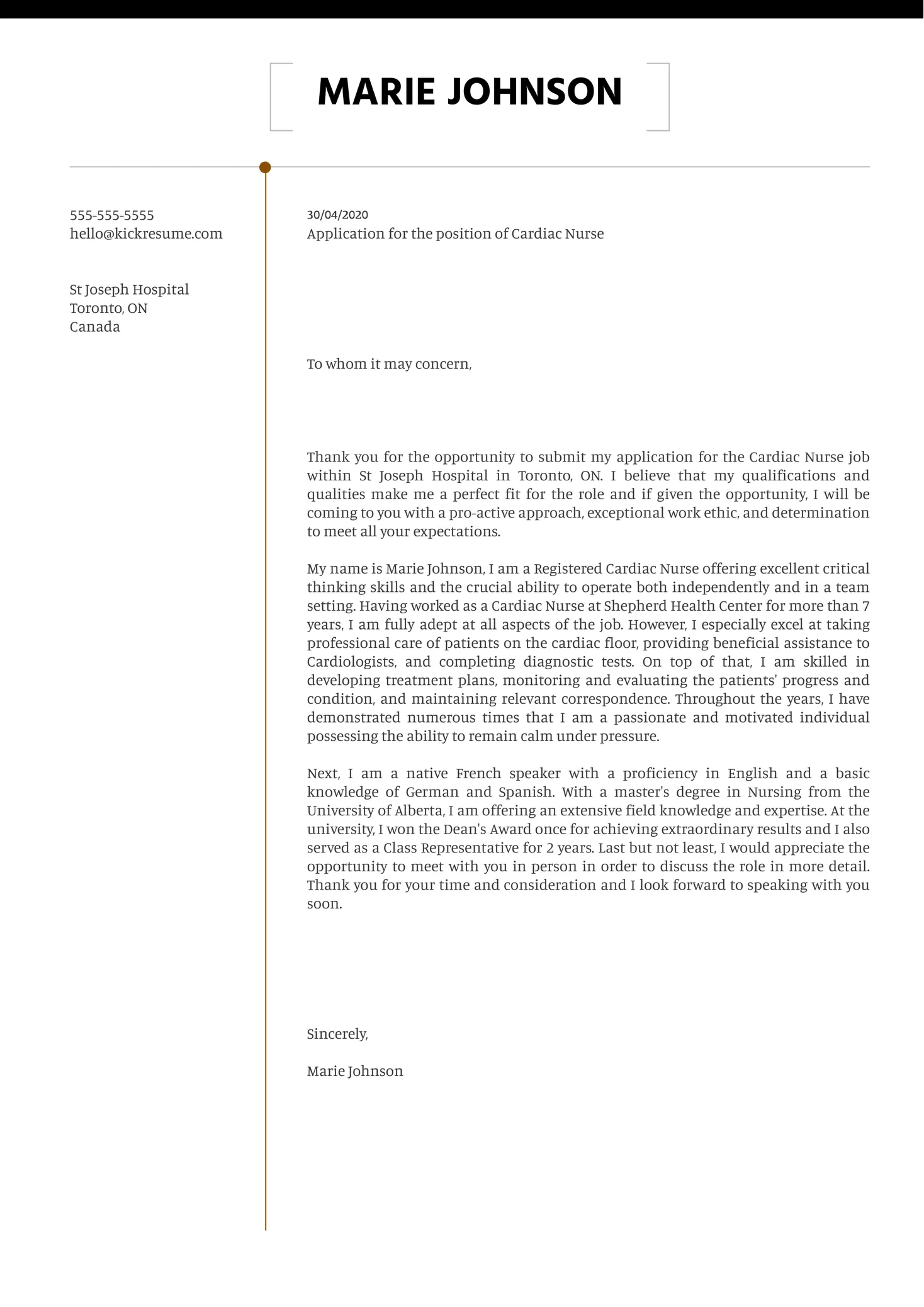
This is where you highlight your relevant skills and experience. Use specific examples to illustrate your abilities. Describe your accomplishments, focusing on how you’ve positively impacted patient care or improved healthcare outcomes. Quantify your achievements whenever possible (e.g., “reduced patient falls by 15%”). Tailor this section to match the job description, emphasizing the skills and experiences the employer is seeking. This shows the hiring manager that you have the qualifications they need.
Body Paragraph 3: Why This Job
In this paragraph, explain why you are interested in this specific job and healthcare facility. Research the facility’s mission, values, and recent achievements. Explain how your values align with theirs. Show that you understand their specific needs. Discuss what attracts you to this particular role and how it aligns with your career goals. Demonstrate your genuine interest in the position and the organization.
Closing of your Cover Letter
In the closing paragraph, reiterate your interest in the position and thank the hiring manager for their time and consideration. Express your eagerness to discuss your qualifications further in an interview. Include a call to action by stating that you look forward to hearing from them soon. Reiterate your contact information one last time. End with a professional closing, such as “Sincerely” or “Best regards,” followed by your typed name.
Proofreading and Formatting
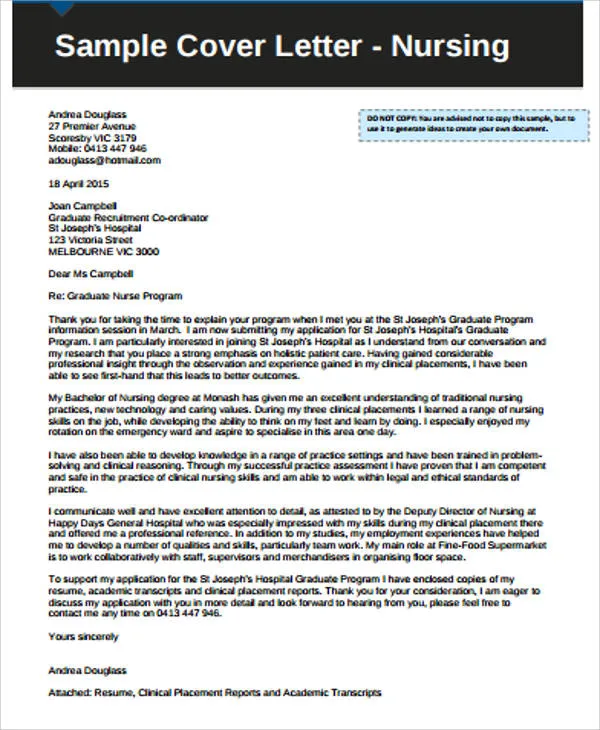
Before submitting your cover letter, carefully proofread it for any typos, grammatical errors, or formatting inconsistencies. Use a professional font, such as Times New Roman or Arial, and ensure your cover letter is easy to read. Check the font size and spacing to make sure it is not too large or too small. Make sure the layout is neat and organized. Have a friend or mentor review your cover letter. A polished cover letter demonstrates your professionalism and attention to detail.
Common Mistakes to Avoid
Avoiding common mistakes is essential for creating a successful nursing cover letter. Many applicants miss key opportunities. You can significantly improve your chances of success by avoiding these pitfalls.
Generic Content
Avoid using a generic cover letter. Tailor your cover letter to each job you apply for. Customize it to match the specific requirements and needs of the healthcare facility and the position. Generic letters do not show the hiring manager that you have a genuine interest in the role. Personalizing your cover letter is essential. Show that you have taken the time to understand the job requirements and the facility’s mission.
Typos and Grammatical Errors
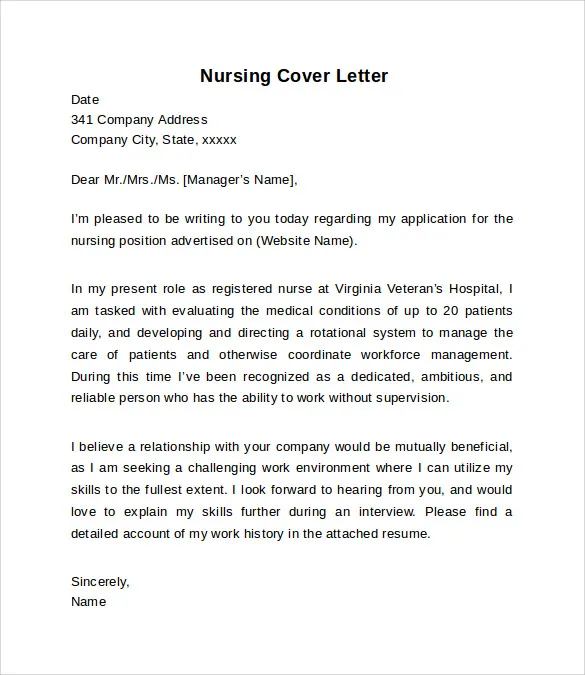
Typos and grammatical errors can make a bad impression. Always proofread your cover letter carefully before submitting it. Errors make you look unprofessional and careless. Use spell check and grammar check tools. Have someone else review your letter to catch any mistakes you might have missed. A clean, error-free cover letter shows you pay attention to detail.
Ignoring the Job Description
Carefully read the job description and address the key requirements and qualifications. Highlight how your skills and experience align with what the employer is looking for. Tailor your cover letter to match the job description. Show that you understand the role and what the employer wants. This shows that you are a good fit for the position.
Examples of Nursing Cover Letters
Reviewing example cover letters can provide valuable insights. See how successful applicants have presented their skills. These examples offer practical models to help create your own cover letter. Here are two examples.
Registered Nurse (RN) Cover Letter Example

Example RN Cover Letter (This is a sample, you will need to adjust to fit your experience and the job requirements):
[Your Name] [Your Address] [Your Phone Number] [Your Email]
[Date]
[Hiring Manager Name (if known), or “Hiring Manager”] [Hospital Name] [Hospital Address]
Dear [Mr./Ms. Last Name or Hiring Manager],
I am writing to express my keen interest in the Registered Nurse position at [Hospital Name], as advertised on [Platform]. With over [Number] years of experience in [Specialty, e.g., critical care, med-surg], I am confident in my ability to provide high-quality, compassionate care to patients and contribute to your team’s success.
In my previous role at [Previous Hospital], I was responsible for [List 2-3 key responsibilities and achievements, quantifying them if possible, e.g., “reduced patient falls by 10%”, “administered medications to over 50 patients daily with zero errors”]. I am proficient in [List key skills, e.g., EMR systems, patient assessment, IV insertion, medication administration]. I am a highly motivated and detail-oriented individual with a strong commitment to patient safety and satisfaction.
I am particularly drawn to [Hospital Name] because of [Mention something specific about the hospital, e.g., its reputation for excellence in patient care, its commitment to community health, its research opportunities]. I am eager to contribute my skills and expertise to your esteemed institution.
Thank you for considering my application. I have attached my resume for your review and welcome the opportunity to discuss my qualifications further in an interview. I can be reached at [Your Phone Number] or [Your Email].
Sincerely, [Your Typed Name] [Your Credentials, e.g., RN, BSN]
Licensed Practical Nurse (LPN) Cover Letter Example
Example LPN Cover Letter (This is a sample, you will need to adjust to fit your experience and the job requirements):
[Your Name] [Your Address] [Your Phone Number] [Your Email]
[Date]
[Hiring Manager Name (if known), or “Hiring Manager”] [Nursing Home Name] [Nursing Home Address]
Dear [Mr./Ms. Last Name or Hiring Manager],
I am writing to express my interest in the Licensed Practical Nurse (LPN) position at [Nursing Home Name], as advertised on [Platform]. With [Number] years of experience providing direct patient care in [Setting, e.g., long-term care, assisted living], I am confident in my ability to contribute to your team.
In my role at [Previous Facility], I was responsible for [List 2-3 key responsibilities and accomplishments, e.g., “assisting with activities of daily living (ADLs) for 20+ residents”, “monitoring and recording vital signs”, “administering medications under the supervision of an RN”]. I have a strong understanding of [Mention relevant skills and knowledge, e.g., wound care, infection control, medication management, charting]. I am a compassionate and dedicated healthcare professional.
I am impressed by [Nursing Home Name]’s commitment to [Mention something specific, e.g., providing a supportive environment, its focus on resident well-being]. I am eager to provide high-quality care to your residents.
Thank you for your time and consideration. I have attached my resume for your review and look forward to the opportunity to discuss my qualifications in an interview. You can reach me at [Your Phone Number] or [Your Email].
Sincerely, [Your Typed Name] [Your Credentials, e.g., LPN]
Conclusion
Writing a compelling nursing cover letter is an important step in the job application process. By following the guidelines provided in this guide, avoiding common mistakes, and tailoring your letter to each job, you can significantly increase your chances of landing an interview and ultimately securing your dream nursing position. Remember to highlight your skills, experience, and passion for nursing. Always proofread your cover letter carefully and present yourself in the best possible light. Good luck with your job search!
